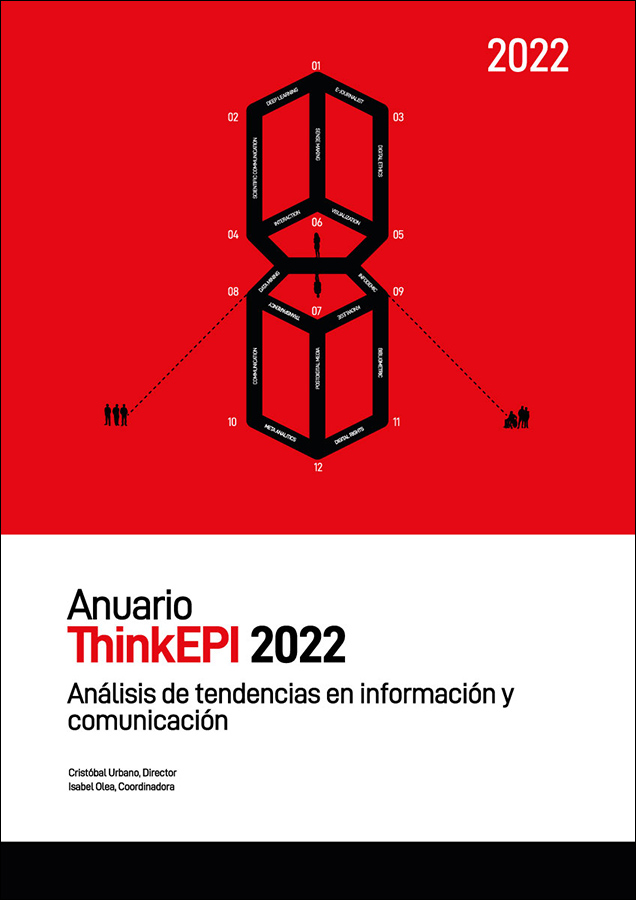Madurez de sistemas de identificadores persistentes: oportunidades en el contexto español
DOI:
https://doi.org/10.3145/thinkepi.2022.e16a06Resumen
Los identificadores persistentes (PID) bien establecidos constituyen una base de confianza para la ciencia abierta. Ayudan a garantizar que las entidades a las que se refieren sean descubribles, accesibles, evaluables, inteligibles, utilizables e interoperables. Tras introducir el papel de los identificadores persistentes en la infraestructura de investigación y en el proceso de FAIRificación, se describen diferentes sistemas de PIDs y sus niveles de madurez. Por último, se comentan oportunidades en el contexto español.
Descargas
Citas
Bach, Nicolas (2021). "Dezentrale Identifikatoren (DIDs)". o-bib. Das offene Bibliotheksjournal, v. 8, n. 4. https://doi.org/10.5282/O-BIB/5755
Brown, Josh; Jones, Phill; Meadows, Alice; Murphy, Fiona; Clayton, Paul (2021). UK PID consortium: Cost-benefit analysis (1.0). Zenodo. https://doi.org/10.5281/zenodo.4772627
Dappert, Angela; Farquhar, Adam; Kotarski, Rachael; Hewlett, Kirstie (2017). "Connecting the persistent Identifier ecosystem: building the technical and human infrastructure for open research". Data science journal, n. 16. https://doi.org/10.5334/dsj-2017-028
European Commission (2020). A Persistent Identifier (PID) policy for the European Open Science Cloud (EOSC). Publications Office. European Commission. Directorate General for Research and Innovation. EOSC Executive Board. https://data.europa.eu/doi/10.2777/926037
Ferguson, Christine; McEntrye, Jo; Bunakov, Vasily; Lambert, Simon; Van-de-Sandt, Stephanie; Kotarski, Rachael; Stewart, Sarah; MacEwan, Andrew; Fenner, Martin; Cruse, Patricia; Van-Horik, René; Dohna, Tina; Koop-Jacobsen, Ketil; Schindler, Uwe; McCafferty, Slobhan (2019). D3.1 Survey of current PID Services Landscape"”Revised. https://doi.org/10.5281/zenodo.3554254
Hodson, Simon; Jones, Sarah; Collins, Sandra; Genova, Franí§oise; Harrower, Natalie; Laaksonen, Leif; Mietchen, Daniel; Petrauskaité, Rí¼ta; Wittenburg, Peter (2018). Turning FAIR data into reality: Interim report from the European Commission Expert Group on FAIR data. https://doi.org/10.5281/zenodo.1285271
Kunze, J. (2013). The ARK identifier scheme. https://tools.ietf.org/html/draft-kunze-ark-18
Kunze, John (2018). "10 persistent myths about persistent identifiers (PIDs)". Twitter. @jakkbl, 24 agosto. https://twitter.com/jakkbl/status/1033059109346586624
Lavasa, Artemis; Dallmeier-Tiessen, Sunje; Van-de-Sandt, Stephanie; Tsanaktsidis, Ioannis; Trzcinska, Anna; Fokianos, Pamfilos; Dohna, Tina; Koop-Jakobsen, Ketil; Schindler, Uwe; Lemon, Barbara; Kotarski, Rachael; Ferguson, Christine; McEntyre, Jo; Lambert, Simon; Bunakov, Vasily; Baars, Chris; De-Jong, Maaike (2018). Deliverable 4.1 integration of mature PID types. https://doi.org/10.5281/ZENODO.2414839
McMurry, Julie A.; Juty, Nick; Blomberg, Niklas; Burdett, Tony; Conlin, Tom; Conte, Nathalie; Courtot, Mélanie; Deck, John; Dumontier, Michael; Fellows, Donal K.; Gonzalez-Beltran, Alejandra; Gormanns, Philipp; Grethe, Jeffrey; "¦ Parkinson, Helen (2017). Identifiers for the 21st century: How to design, provision, and reuse persistent identifiers to maximize utility and impact of life science data. PLOS Biology, v. 15, n. 6, e2001414. https://doi.org/10.1371/journal.pbio.2001414
Meadows, Alice; Haak, Laurel L.; Brown, Josh (2019). "Persistent identifiers: The building blocks of the research information infrastructure". Insights the UKSG journal, n. 32. https://doi.org/10.1629/uksg.457
Wilkinson, Mark D.; Dumontier, Michel; Aalbersberg, Ijsbrand-Jan; Appleton, Gabrielle; Axton, Myles; Baak, Arie; Blomberg, Niklas; Boiten, Jan-Willem; Da-Silva-Santos, Luiz B.; Bourne, Philip E.; Bouwman, Jildau; Brookes, Anthony J.; Clark, Tim; Crosas, Mercí¨; Dillo, Ingrid; Dumon, Olivier; Edmunds, Scott; Evelo, Chris T.; Finkers, Richard; "¦ Mons, Barend (2016). "The FAIR Guiding Principles for scientific data management and stewardship". Scientific data, n. 3, 160018. https://doi.org/10.1038/sdata.2016.18
Descargas
Publicado
Cómo citar
Dimensions


